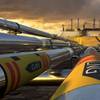As global attention in the wake of the Indian Ocean tsunami tragedy turns towards the massive job of repairing long-term damage and restoring battered infrastructures, the International Maritime Organization (IMO) is playing its part in co-ordinating efforts to attend to the maritime infrastructure in the affected regions.
IMO Secretary-General Efthimios E. Mitropoulos has stressed the strategic importance of ensuring that ports, navigational aids and other key elements of the maritime infrastructure are in effective working order as soon as possible, both to facilitate the medium and long-term recovery of the affected areas and to ensure that short-term aid arriving by sea can do so efficiently and in safety.
IMO has initiated consultations with organizations such as the World Meteorological Organization, the International Hydrographic Organization (IHO), and the International Association of Aids to Navigation and Lighthouse Authorities (IALA) concerning priority actions aimed at the safety of shipping, such as the provision of advice and warnings on the availability and reliance of soundings, navaids and other elements of the maritime infrastructure in the affected areas.
IMO is also in contact with the United Nations Development Programme (UNDP) and the Regional Programme for Marine Pollution Prevention and Management in the East Asian Seas region (PEMSEA) with respect to possible short term and medium term activities.
In addition, the Secretary-General has established a fund (the "Tsunami Maritime Relief Fund") through which the shipping industry's direct financial and in-kind aid for the victims of the disaster might be co-ordinated and has written to all non-governmental organizations (NGOs) in consultative status with IMO drawing it to their attention and encouraging their generous contribution. The IMO staff has already begun contributing to the Fund.
In the medium to longer term, IMO plans to field needs-assessment missions to affected countries, both to assess the situation and to establish appropriate follow-up activities, such as re-building their fishing capacity, and also to prioritize IMO responses. The Organization will seek to co-ordinate these activities with other agencies, such as the Food and Agriculture Organization (FAO), the International Labour Organization (ILO) and the World Bank, as appropriate.
Steps will also be taken to assess any action that may have been taken by Maritime Rescue Co-ordination Centres in the region in response to (or in the absence of) information about the earthquake and tsunami and the possibility of more effective use being made of the maritime safety networks established by IMO to disseminate other information will be investigated.
In the immediate aftermath of the Boxing Day tragedy, Mr. Mitropoulos wrote, on behalf of the Organization to United Nations Secretary-General Kofi Annan and to the Under-Secretary-General for Humanitarian Affairs and Emergency Relief Co-ordinator, Office for the Coordination of Humanitarian Affairs (OCHA) to express the maritime community's sadness at the enormity of the disaster and to offer all available assistance in support of the wider UN efforts to bring aid and comfort to those in need. He has also written to the High Commissioners of Bangladesh, India, Malaysia, the Maldives and Sri Lanka and to the Ambassadors of Indonesia, Myanmar and Thailand with similar messages of condolence and offers of assistance.
Subscribe for
Maritime Reporter E-News
Maritime Reporter E-News is the maritime industry's largest circulation and most authoritative ENews Service, delivered to your Email five times per week










